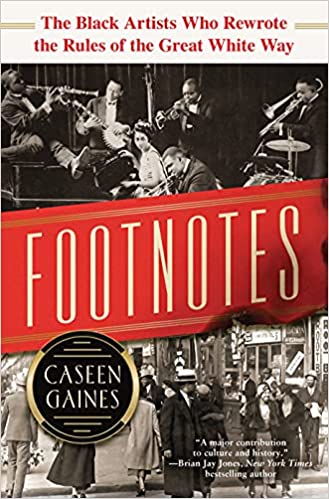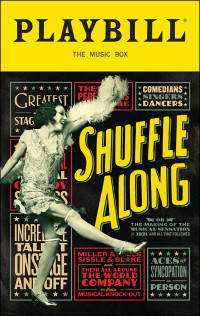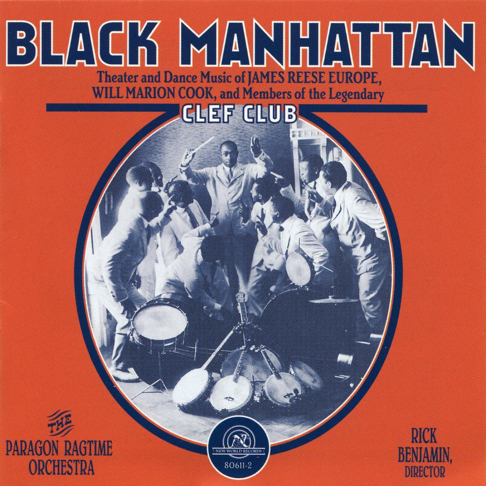Kevin Clarke
Operetta Research Center
21 November, 2021
Another Porgy and Bess recording? Pentanone Classics has released highlights conducted by Marin Alsop, taken from a live concert in Philadelphia in March 2020. With Angel Blue as Bess, Serena and Clara, i.e. all the soprano roles.

The “Porgy and Bess” recording conducted by Marin Alsop. (Photo: Pentatone Classics)
The single disc album comes at a time of intensive re-examination of “Black Broadway” and new research into the previously overlooked (and consciously ignored) contribution of Afro-American artists to popular musical theater history.
One of many noteworthy examples is Caseen Gaines’ new book Footnotes; The Black Artists Who Rewrote the Rules of the Great White Way. It deals, mostly, with the creation of Shuffle Along in 1921 as a lang-mark musical that has only recently been acknowledged as a landmark. And of which there is no full recording, until today.

Caseen Gaines’ book “Footnotes; The Black Artists Who Rewrote the Rules of the Great White Way.” (Photo: Sourcebooks)
The most recent Broadway exposure Shuffle Along had was the 2016 production Shuffle Along, or, the Making of the Musical Sensation of 1921 and All That Followed. It had a prominent cast that included Billy Porter, Audra McDonald and Brian Stokes Mitchell. But there was no cast album, no DVD, nothing. It closed after 100 performances (and 38 previews.).

Playbill for the 2016 Broadway revival of “Shuffle Along.” (Photo: Playbill)
If you look at Stewart F. Lane’s 2015 book Black Broadway: African Americans on the Great White Way you’ll find a lot of mention of early operettas written and performed by Black artists, shows that tried to depict their lives for a mainstream audience. All of these once groundbreaking shows are also not available on record. In many cases it’s difficult to find even material.

Stewart F. Lane’s “Black Broadway.”
The Paragon Ragtime Orchestra, meanwhile, has released a three-volume set of CDs entitled Black Manhattan. On these you hear conductor Rick Benjamin and the orchestra with a wide range of music that’s taken from Shuffle Along, but mostly from other important early shows. For example, there’s the overture to My Friend from Kentucky (1913) and there’s the 1900 Lift Every Voice and Sing: National Negro Hymn (by James Weldon Johnson and J. Rosamond Johnson).

One of the “Black Manhattan” volumes recorded by the Paragon Ragtime Orchestra. (Photo: New World Records)
There are gems like the “Wall Street Rag” (1909) and “Dear Old Southland” from Strut, Miss Lizzie (1921). Also music made famous by soprano Matilda Sissieretta. Sadly the orchestra – and especially the singers – on this Black Manhattan series sound dull and uninspired. They don’t make it understandable why these “jazz spasms” once caused a sensation. There’s none of the urgency and drive that we read about in Gaines’ book. So you could argue, that Rick Benjamin and his team are doing these forgotten shows as disservice. But at least they made a first attempt to get them on record, more than a century after the material was originally created. And that deserves all the applause in the world!
It’s an exploration that has only just started. And, obviously, it would have been interesting to hear Angel Blue in this repertoire, especially that of Matilda Sissieretta, once known as “The Black Patti”.
Instead, on the new Porgy and Bess Angel Blue sings like a clone of Leontyne Price. She sounds glorious throughout, no question about it, but no one can surpass Price and her importance as Bess. So a different approach to the role would probably have been the more intelligent option.
Marin Alsop lets the Philadelphia Orchestra play Gershwin in a lush and opulent way, with little emphasis on contrast and without much of a Broadway bounce. Lester Lynch is a good Porgy, but not singular enough next to so many outstanding Porgy interpreters of the past. Kevin Short can be heard as Crown and Jake, Chauncey Packer is a dazzling Sportin‘ Life who brings great flair to his scenes.
All in all, this is no re-discovery of the beloved Gershwin classic. And certainly no groundbreaking new look at this “Folk Opera”. It’s a valuable new recording, nonetheless. With soloists I personally would have rather heard in Clorindy or Darktown Is Out Tonight, not to mention The Swinging Mikado or Hot Mikado, or most importantly in In Dahomey.
Does Penatone Classics fear that there is no market for such recordings? Is that why other record labels are not exploring this repertoire either? Are they afraid of controversies regarding racism and inappropriate depictions of Afro-Americans? In shows written by Afro-Americans about Afro-Americans…?

“The Black Patti, Mme. M. Sissieretta Jones the greatest singer of her race.” Published 1899.
It seems the discussion has only just begun. And to join the discussion, on firmer ground, it would be helpful to have more of the musical material available on CD. Many recent researchers have pointed the way, and recent movies and documentaries have also pointed in a fascinating direction classical music people might want to follow. If they dare to cast off some of the stiffness that is evident on the new Porgy and Bess, but also in the Black Manhattan series.
